Leadership and Management Report: Aston Martin - Roles & Theories
VerifiedAdded on 2023/01/06
|13
|4376
|78
Report
AI Summary
This report provides an in-depth analysis of leadership and management practices, using Aston Martin as a case study. It defines and compares the roles and characteristics of leaders and managers, highlighting their functions in various situations, such as new product launches and crisis management. The report explores different leadership theories and models, contrasting transactional and transformational styles. Furthermore, it examines key approaches to operations management, emphasizing its importance in achieving business objectives and assessing the impact of environmental factors on operational decision-making. The analysis covers planning, organizing, directing, and controlling activities within the context of Aston Martin's operations, providing insights into effective leadership and management strategies.
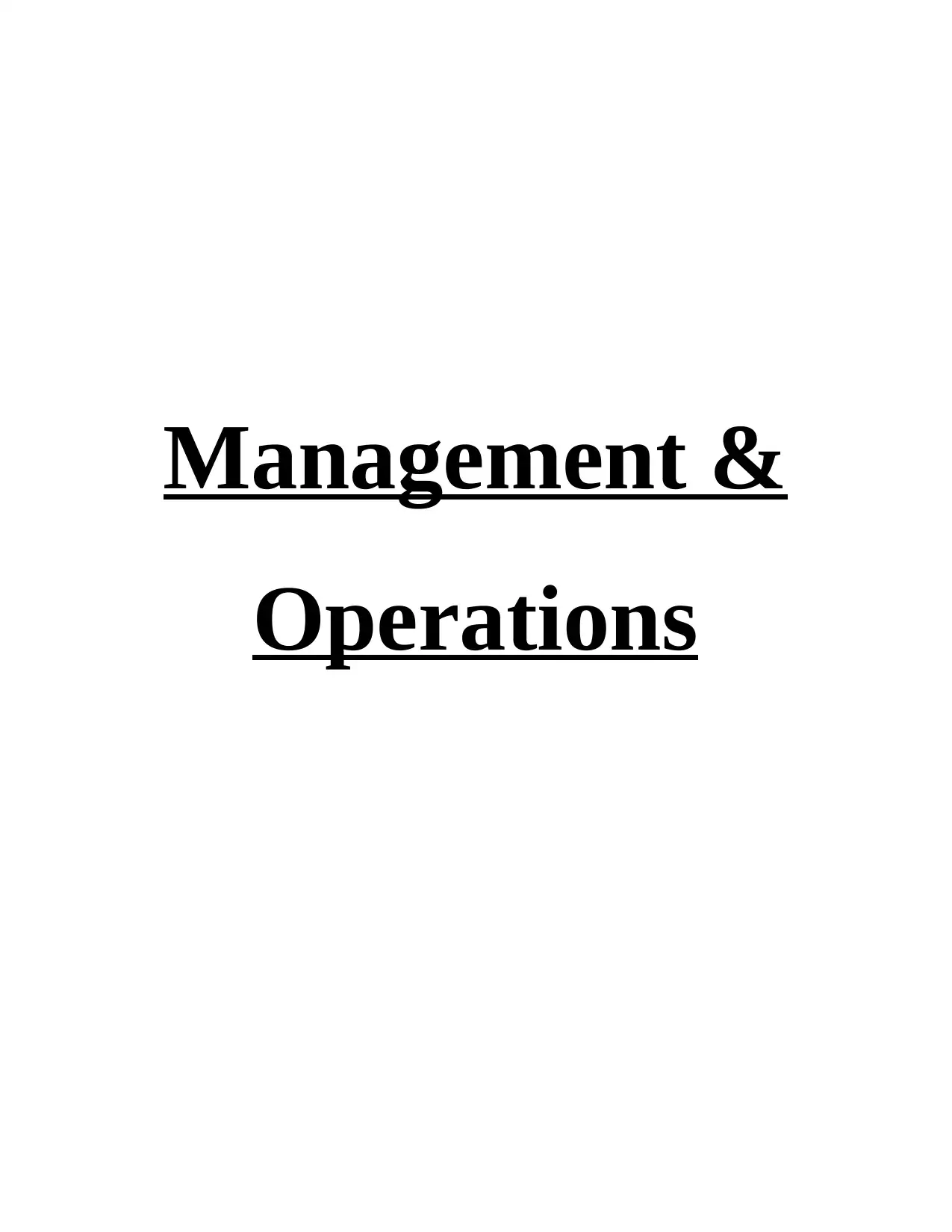
Management &
Operations
Operations
Paraphrase This Document
Need a fresh take? Get an instant paraphrase of this document with our AI Paraphraser
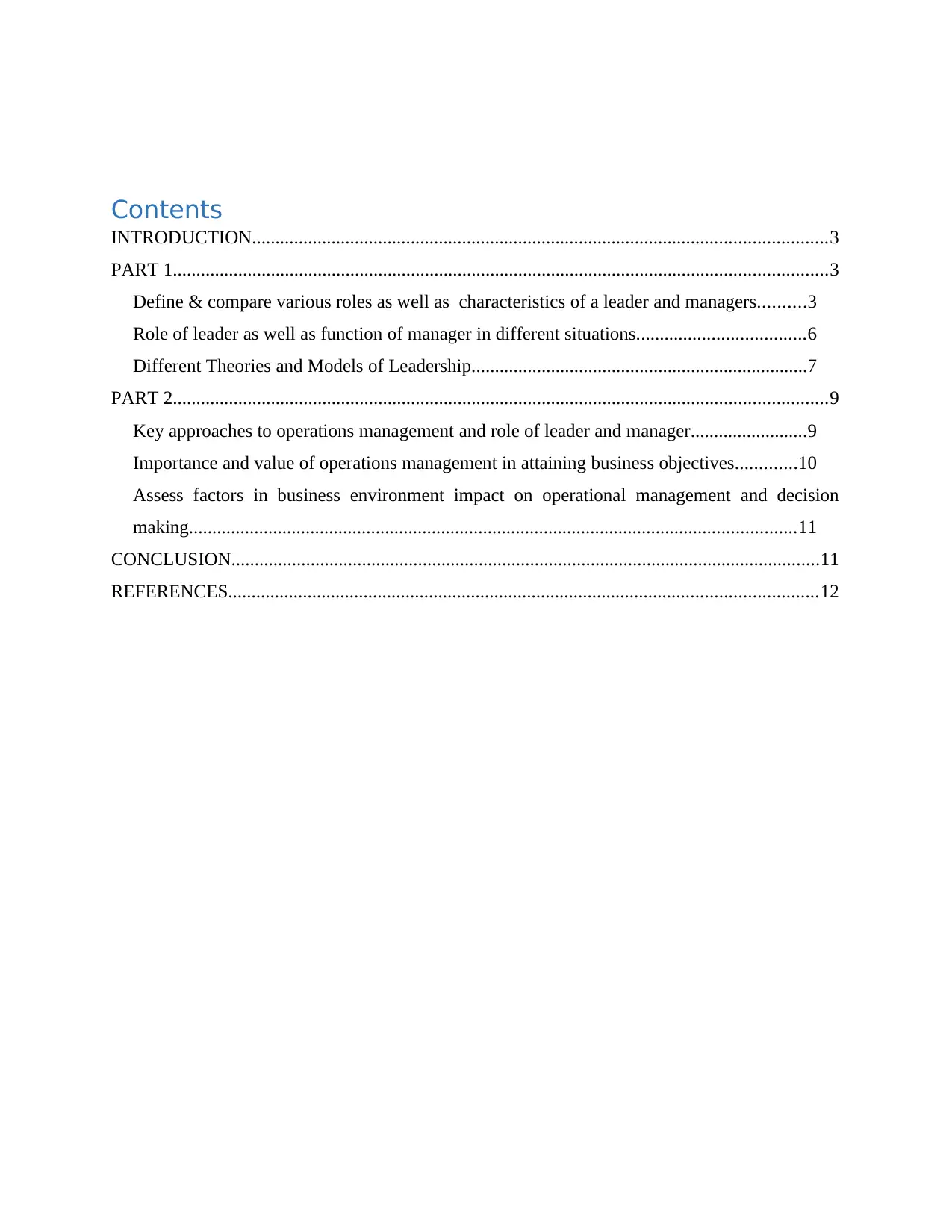
Contents
INTRODUCTION...........................................................................................................................3
PART 1............................................................................................................................................3
Define & compare various roles as well as characteristics of a leader and managers..........3
Role of leader as well as function of manager in different situations....................................6
Different Theories and Models of Leadership........................................................................7
PART 2............................................................................................................................................9
Key approaches to operations management and role of leader and manager.........................9
Importance and value of operations management in attaining business objectives.............10
Assess factors in business environment impact on operational management and decision
making..................................................................................................................................11
CONCLUSION..............................................................................................................................11
REFERENCES..............................................................................................................................12
INTRODUCTION...........................................................................................................................3
PART 1............................................................................................................................................3
Define & compare various roles as well as characteristics of a leader and managers..........3
Role of leader as well as function of manager in different situations....................................6
Different Theories and Models of Leadership........................................................................7
PART 2............................................................................................................................................9
Key approaches to operations management and role of leader and manager.........................9
Importance and value of operations management in attaining business objectives.............10
Assess factors in business environment impact on operational management and decision
making..................................................................................................................................11
CONCLUSION..............................................................................................................................11
REFERENCES..............................................................................................................................12
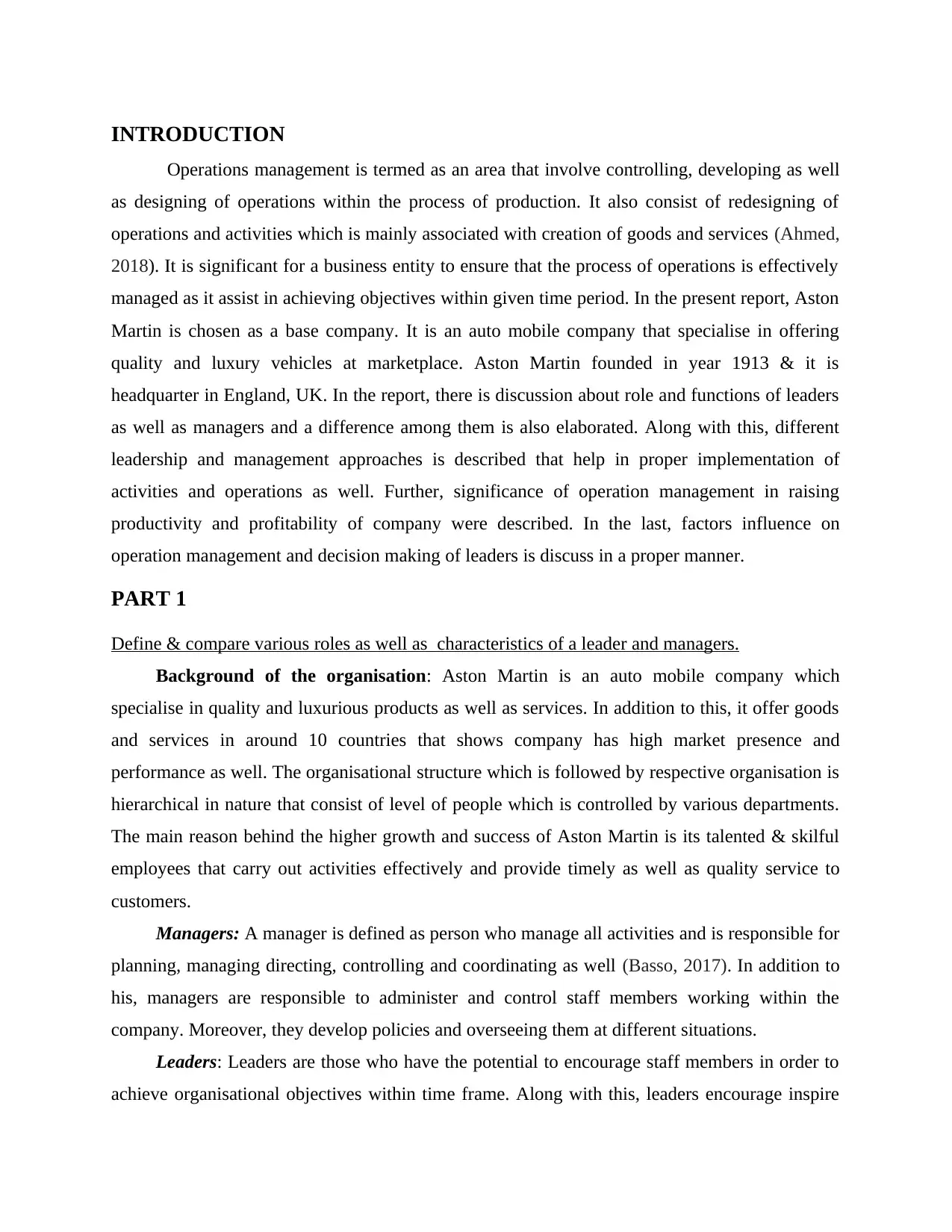
INTRODUCTION
Operations management is termed as an area that involve controlling, developing as well
as designing of operations within the process of production. It also consist of redesigning of
operations and activities which is mainly associated with creation of goods and services (Ahmed,
2018). It is significant for a business entity to ensure that the process of operations is effectively
managed as it assist in achieving objectives within given time period. In the present report, Aston
Martin is chosen as a base company. It is an auto mobile company that specialise in offering
quality and luxury vehicles at marketplace. Aston Martin founded in year 1913 & it is
headquarter in England, UK. In the report, there is discussion about role and functions of leaders
as well as managers and a difference among them is also elaborated. Along with this, different
leadership and management approaches is described that help in proper implementation of
activities and operations as well. Further, significance of operation management in raising
productivity and profitability of company were described. In the last, factors influence on
operation management and decision making of leaders is discuss in a proper manner.
PART 1
Define & compare various roles as well as characteristics of a leader and managers.
Background of the organisation: Aston Martin is an auto mobile company which
specialise in quality and luxurious products as well as services. In addition to this, it offer goods
and services in around 10 countries that shows company has high market presence and
performance as well. The organisational structure which is followed by respective organisation is
hierarchical in nature that consist of level of people which is controlled by various departments.
The main reason behind the higher growth and success of Aston Martin is its talented & skilful
employees that carry out activities effectively and provide timely as well as quality service to
customers.
Managers: A manager is defined as person who manage all activities and is responsible for
planning, managing directing, controlling and coordinating as well (Basso, 2017). In addition to
his, managers are responsible to administer and control staff members working within the
company. Moreover, they develop policies and overseeing them at different situations.
Leaders: Leaders are those who have the potential to encourage staff members in order to
achieve organisational objectives within time frame. Along with this, leaders encourage inspire
Operations management is termed as an area that involve controlling, developing as well
as designing of operations within the process of production. It also consist of redesigning of
operations and activities which is mainly associated with creation of goods and services (Ahmed,
2018). It is significant for a business entity to ensure that the process of operations is effectively
managed as it assist in achieving objectives within given time period. In the present report, Aston
Martin is chosen as a base company. It is an auto mobile company that specialise in offering
quality and luxury vehicles at marketplace. Aston Martin founded in year 1913 & it is
headquarter in England, UK. In the report, there is discussion about role and functions of leaders
as well as managers and a difference among them is also elaborated. Along with this, different
leadership and management approaches is described that help in proper implementation of
activities and operations as well. Further, significance of operation management in raising
productivity and profitability of company were described. In the last, factors influence on
operation management and decision making of leaders is discuss in a proper manner.
PART 1
Define & compare various roles as well as characteristics of a leader and managers.
Background of the organisation: Aston Martin is an auto mobile company which
specialise in quality and luxurious products as well as services. In addition to this, it offer goods
and services in around 10 countries that shows company has high market presence and
performance as well. The organisational structure which is followed by respective organisation is
hierarchical in nature that consist of level of people which is controlled by various departments.
The main reason behind the higher growth and success of Aston Martin is its talented & skilful
employees that carry out activities effectively and provide timely as well as quality service to
customers.
Managers: A manager is defined as person who manage all activities and is responsible for
planning, managing directing, controlling and coordinating as well (Basso, 2017). In addition to
his, managers are responsible to administer and control staff members working within the
company. Moreover, they develop policies and overseeing them at different situations.
Leaders: Leaders are those who have the potential to encourage staff members in order to
achieve organisational objectives within time frame. Along with this, leaders encourage inspire
⊘ This is a preview!⊘
Do you want full access?
Subscribe today to unlock all pages.

Trusted by 1+ million students worldwide
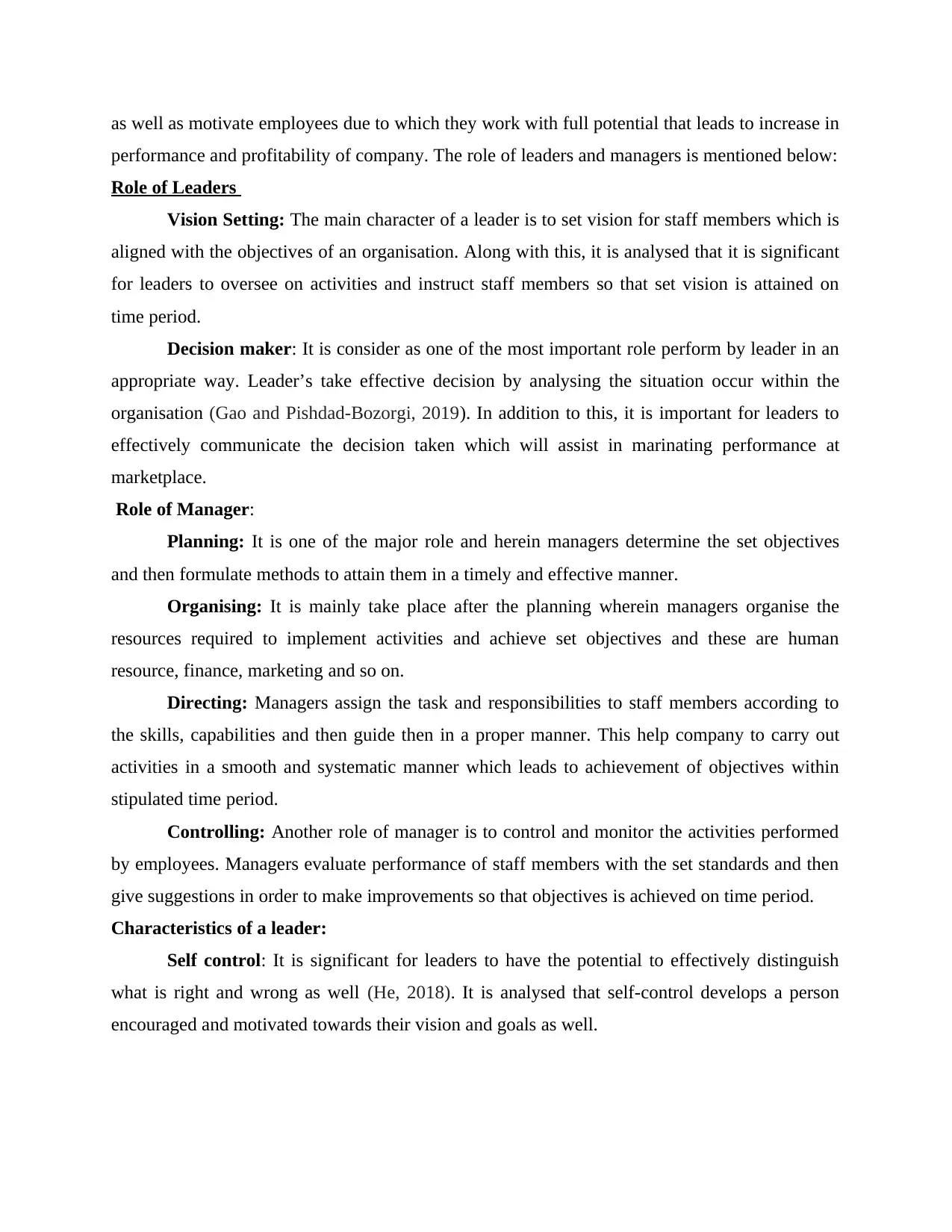
as well as motivate employees due to which they work with full potential that leads to increase in
performance and profitability of company. The role of leaders and managers is mentioned below:
Role of Leaders
Vision Setting: The main character of a leader is to set vision for staff members which is
aligned with the objectives of an organisation. Along with this, it is analysed that it is significant
for leaders to oversee on activities and instruct staff members so that set vision is attained on
time period.
Decision maker: It is consider as one of the most important role perform by leader in an
appropriate way. Leader’s take effective decision by analysing the situation occur within the
organisation (Gao and Pishdad-Bozorgi, 2019). In addition to this, it is important for leaders to
effectively communicate the decision taken which will assist in marinating performance at
marketplace.
Role of Manager:
Planning: It is one of the major role and herein managers determine the set objectives
and then formulate methods to attain them in a timely and effective manner.
Organising: It is mainly take place after the planning wherein managers organise the
resources required to implement activities and achieve set objectives and these are human
resource, finance, marketing and so on.
Directing: Managers assign the task and responsibilities to staff members according to
the skills, capabilities and then guide then in a proper manner. This help company to carry out
activities in a smooth and systematic manner which leads to achievement of objectives within
stipulated time period.
Controlling: Another role of manager is to control and monitor the activities performed
by employees. Managers evaluate performance of staff members with the set standards and then
give suggestions in order to make improvements so that objectives is achieved on time period.
Characteristics of a leader:
Self control: It is significant for leaders to have the potential to effectively distinguish
what is right and wrong as well (He, 2018). It is analysed that self-control develops a person
encouraged and motivated towards their vision and goals as well.
performance and profitability of company. The role of leaders and managers is mentioned below:
Role of Leaders
Vision Setting: The main character of a leader is to set vision for staff members which is
aligned with the objectives of an organisation. Along with this, it is analysed that it is significant
for leaders to oversee on activities and instruct staff members so that set vision is attained on
time period.
Decision maker: It is consider as one of the most important role perform by leader in an
appropriate way. Leader’s take effective decision by analysing the situation occur within the
organisation (Gao and Pishdad-Bozorgi, 2019). In addition to this, it is important for leaders to
effectively communicate the decision taken which will assist in marinating performance at
marketplace.
Role of Manager:
Planning: It is one of the major role and herein managers determine the set objectives
and then formulate methods to attain them in a timely and effective manner.
Organising: It is mainly take place after the planning wherein managers organise the
resources required to implement activities and achieve set objectives and these are human
resource, finance, marketing and so on.
Directing: Managers assign the task and responsibilities to staff members according to
the skills, capabilities and then guide then in a proper manner. This help company to carry out
activities in a smooth and systematic manner which leads to achievement of objectives within
stipulated time period.
Controlling: Another role of manager is to control and monitor the activities performed
by employees. Managers evaluate performance of staff members with the set standards and then
give suggestions in order to make improvements so that objectives is achieved on time period.
Characteristics of a leader:
Self control: It is significant for leaders to have the potential to effectively distinguish
what is right and wrong as well (He, 2018). It is analysed that self-control develops a person
encouraged and motivated towards their vision and goals as well.
Paraphrase This Document
Need a fresh take? Get an instant paraphrase of this document with our AI Paraphraser
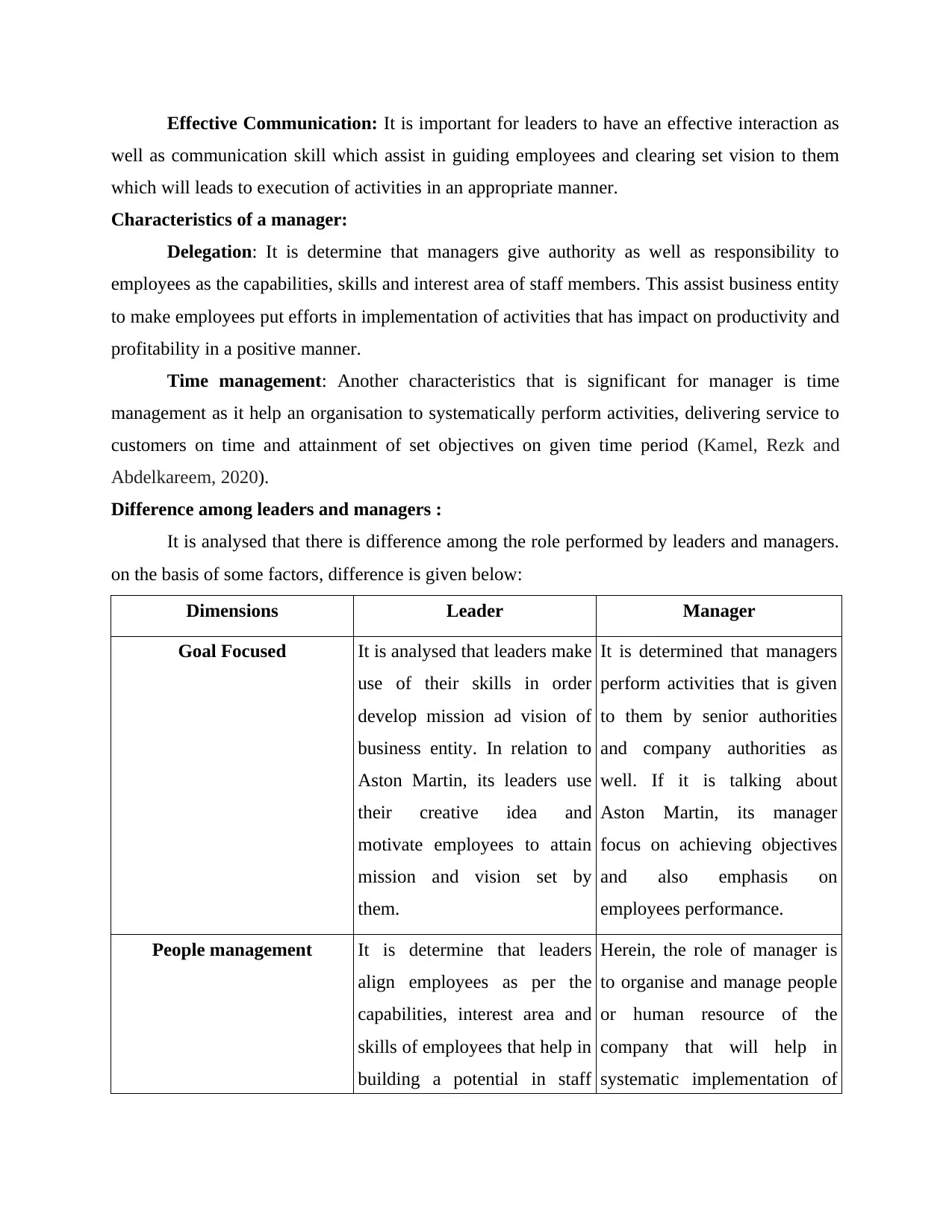
Effective Communication: It is important for leaders to have an effective interaction as
well as communication skill which assist in guiding employees and clearing set vision to them
which will leads to execution of activities in an appropriate manner.
Characteristics of a manager:
Delegation: It is determine that managers give authority as well as responsibility to
employees as the capabilities, skills and interest area of staff members. This assist business entity
to make employees put efforts in implementation of activities that has impact on productivity and
profitability in a positive manner.
Time management: Another characteristics that is significant for manager is time
management as it help an organisation to systematically perform activities, delivering service to
customers on time and attainment of set objectives on given time period (Kamel, Rezk and
Abdelkareem, 2020).
Difference among leaders and managers :
It is analysed that there is difference among the role performed by leaders and managers.
on the basis of some factors, difference is given below:
Dimensions Leader Manager
Goal Focused It is analysed that leaders make
use of their skills in order
develop mission ad vision of
business entity. In relation to
Aston Martin, its leaders use
their creative idea and
motivate employees to attain
mission and vision set by
them.
It is determined that managers
perform activities that is given
to them by senior authorities
and company authorities as
well. If it is talking about
Aston Martin, its manager
focus on achieving objectives
and also emphasis on
employees performance.
People management It is determine that leaders
align employees as per the
capabilities, interest area and
skills of employees that help in
building a potential in staff
Herein, the role of manager is
to organise and manage people
or human resource of the
company that will help in
systematic implementation of
well as communication skill which assist in guiding employees and clearing set vision to them
which will leads to execution of activities in an appropriate manner.
Characteristics of a manager:
Delegation: It is determine that managers give authority as well as responsibility to
employees as the capabilities, skills and interest area of staff members. This assist business entity
to make employees put efforts in implementation of activities that has impact on productivity and
profitability in a positive manner.
Time management: Another characteristics that is significant for manager is time
management as it help an organisation to systematically perform activities, delivering service to
customers on time and attainment of set objectives on given time period (Kamel, Rezk and
Abdelkareem, 2020).
Difference among leaders and managers :
It is analysed that there is difference among the role performed by leaders and managers.
on the basis of some factors, difference is given below:
Dimensions Leader Manager
Goal Focused It is analysed that leaders make
use of their skills in order
develop mission ad vision of
business entity. In relation to
Aston Martin, its leaders use
their creative idea and
motivate employees to attain
mission and vision set by
them.
It is determined that managers
perform activities that is given
to them by senior authorities
and company authorities as
well. If it is talking about
Aston Martin, its manager
focus on achieving objectives
and also emphasis on
employees performance.
People management It is determine that leaders
align employees as per the
capabilities, interest area and
skills of employees that help in
building a potential in staff
Herein, the role of manager is
to organise and manage people
or human resource of the
company that will help in
systematic implementation of
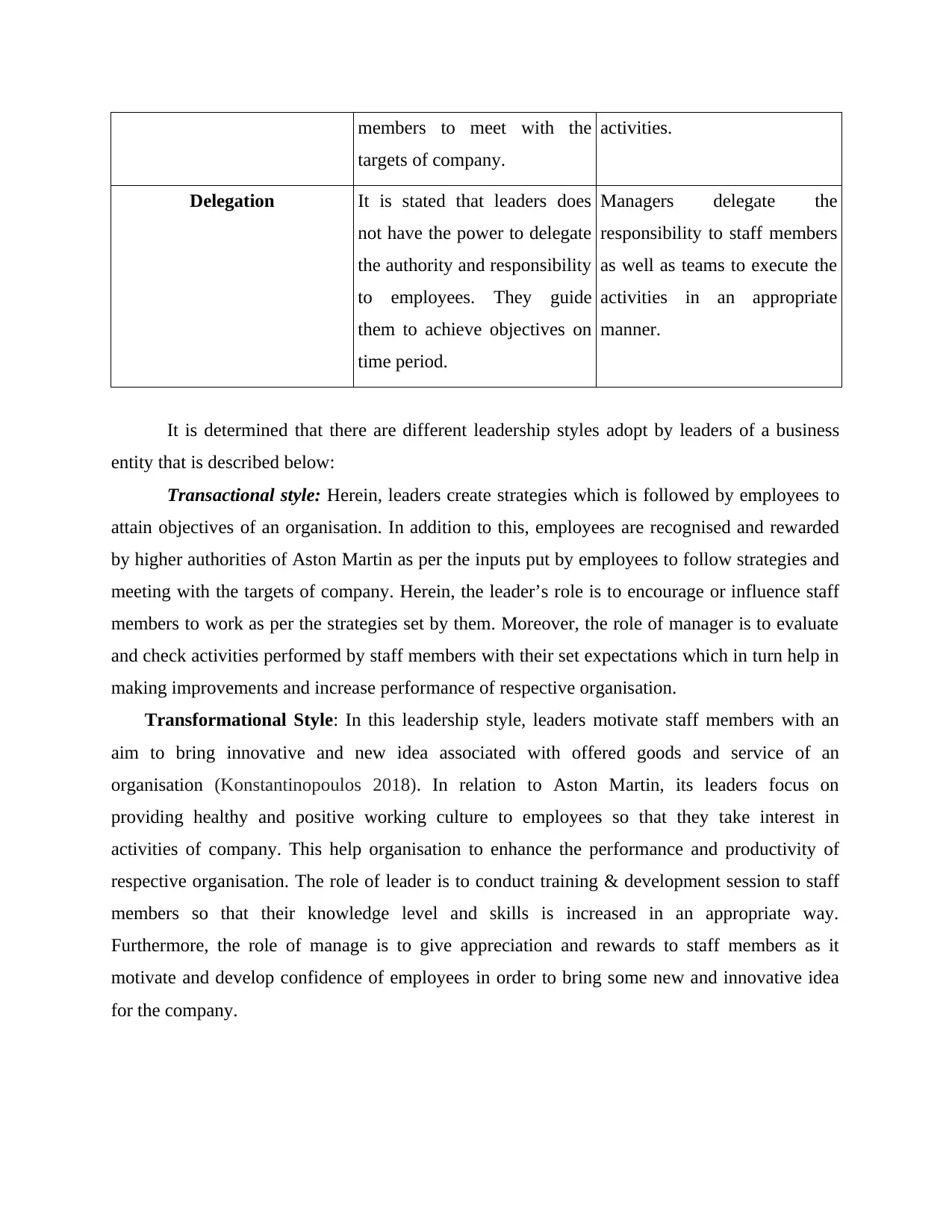
members to meet with the
targets of company.
activities.
Delegation It is stated that leaders does
not have the power to delegate
the authority and responsibility
to employees. They guide
them to achieve objectives on
time period.
Managers delegate the
responsibility to staff members
as well as teams to execute the
activities in an appropriate
manner.
It is determined that there are different leadership styles adopt by leaders of a business
entity that is described below:
Transactional style: Herein, leaders create strategies which is followed by employees to
attain objectives of an organisation. In addition to this, employees are recognised and rewarded
by higher authorities of Aston Martin as per the inputs put by employees to follow strategies and
meeting with the targets of company. Herein, the leader’s role is to encourage or influence staff
members to work as per the strategies set by them. Moreover, the role of manager is to evaluate
and check activities performed by staff members with their set expectations which in turn help in
making improvements and increase performance of respective organisation.
Transformational Style: In this leadership style, leaders motivate staff members with an
aim to bring innovative and new idea associated with offered goods and service of an
organisation (Konstantinopoulos 2018). In relation to Aston Martin, its leaders focus on
providing healthy and positive working culture to employees so that they take interest in
activities of company. This help organisation to enhance the performance and productivity of
respective organisation. The role of leader is to conduct training & development session to staff
members so that their knowledge level and skills is increased in an appropriate way.
Furthermore, the role of manage is to give appreciation and rewards to staff members as it
motivate and develop confidence of employees in order to bring some new and innovative idea
for the company.
targets of company.
activities.
Delegation It is stated that leaders does
not have the power to delegate
the authority and responsibility
to employees. They guide
them to achieve objectives on
time period.
Managers delegate the
responsibility to staff members
as well as teams to execute the
activities in an appropriate
manner.
It is determined that there are different leadership styles adopt by leaders of a business
entity that is described below:
Transactional style: Herein, leaders create strategies which is followed by employees to
attain objectives of an organisation. In addition to this, employees are recognised and rewarded
by higher authorities of Aston Martin as per the inputs put by employees to follow strategies and
meeting with the targets of company. Herein, the leader’s role is to encourage or influence staff
members to work as per the strategies set by them. Moreover, the role of manager is to evaluate
and check activities performed by staff members with their set expectations which in turn help in
making improvements and increase performance of respective organisation.
Transformational Style: In this leadership style, leaders motivate staff members with an
aim to bring innovative and new idea associated with offered goods and service of an
organisation (Konstantinopoulos 2018). In relation to Aston Martin, its leaders focus on
providing healthy and positive working culture to employees so that they take interest in
activities of company. This help organisation to enhance the performance and productivity of
respective organisation. The role of leader is to conduct training & development session to staff
members so that their knowledge level and skills is increased in an appropriate way.
Furthermore, the role of manage is to give appreciation and rewards to staff members as it
motivate and develop confidence of employees in order to bring some new and innovative idea
for the company.
⊘ This is a preview!⊘
Do you want full access?
Subscribe today to unlock all pages.

Trusted by 1+ million students worldwide
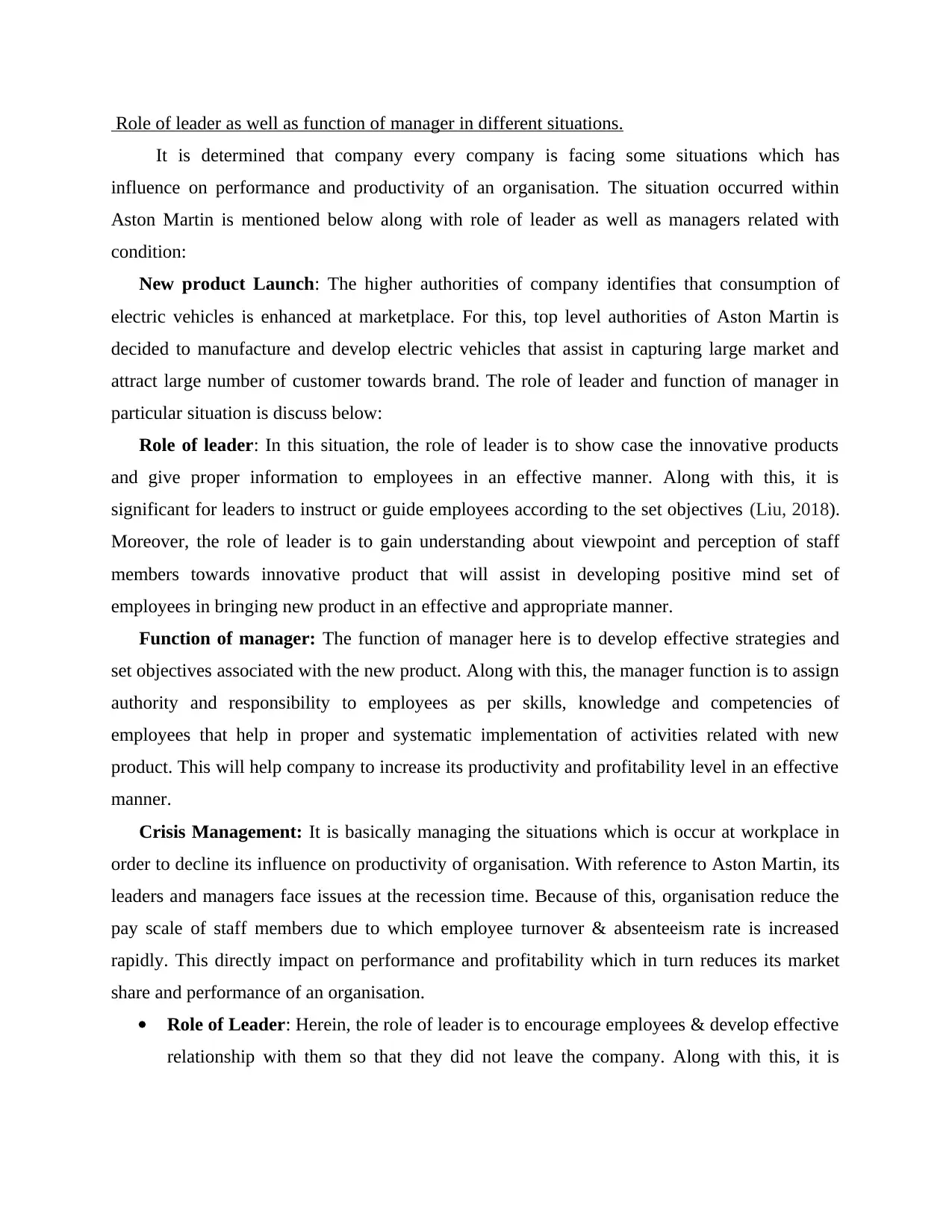
Role of leader as well as function of manager in different situations.
It is determined that company every company is facing some situations which has
influence on performance and productivity of an organisation. The situation occurred within
Aston Martin is mentioned below along with role of leader as well as managers related with
condition:
New product Launch: The higher authorities of company identifies that consumption of
electric vehicles is enhanced at marketplace. For this, top level authorities of Aston Martin is
decided to manufacture and develop electric vehicles that assist in capturing large market and
attract large number of customer towards brand. The role of leader and function of manager in
particular situation is discuss below:
Role of leader: In this situation, the role of leader is to show case the innovative products
and give proper information to employees in an effective manner. Along with this, it is
significant for leaders to instruct or guide employees according to the set objectives (Liu, 2018).
Moreover, the role of leader is to gain understanding about viewpoint and perception of staff
members towards innovative product that will assist in developing positive mind set of
employees in bringing new product in an effective and appropriate manner.
Function of manager: The function of manager here is to develop effective strategies and
set objectives associated with the new product. Along with this, the manager function is to assign
authority and responsibility to employees as per skills, knowledge and competencies of
employees that help in proper and systematic implementation of activities related with new
product. This will help company to increase its productivity and profitability level in an effective
manner.
Crisis Management: It is basically managing the situations which is occur at workplace in
order to decline its influence on productivity of organisation. With reference to Aston Martin, its
leaders and managers face issues at the recession time. Because of this, organisation reduce the
pay scale of staff members due to which employee turnover & absenteeism rate is increased
rapidly. This directly impact on performance and profitability which in turn reduces its market
share and performance of an organisation.
Role of Leader: Herein, the role of leader is to encourage employees & develop effective
relationship with them so that they did not leave the company. Along with this, it is
It is determined that company every company is facing some situations which has
influence on performance and productivity of an organisation. The situation occurred within
Aston Martin is mentioned below along with role of leader as well as managers related with
condition:
New product Launch: The higher authorities of company identifies that consumption of
electric vehicles is enhanced at marketplace. For this, top level authorities of Aston Martin is
decided to manufacture and develop electric vehicles that assist in capturing large market and
attract large number of customer towards brand. The role of leader and function of manager in
particular situation is discuss below:
Role of leader: In this situation, the role of leader is to show case the innovative products
and give proper information to employees in an effective manner. Along with this, it is
significant for leaders to instruct or guide employees according to the set objectives (Liu, 2018).
Moreover, the role of leader is to gain understanding about viewpoint and perception of staff
members towards innovative product that will assist in developing positive mind set of
employees in bringing new product in an effective and appropriate manner.
Function of manager: The function of manager here is to develop effective strategies and
set objectives associated with the new product. Along with this, the manager function is to assign
authority and responsibility to employees as per skills, knowledge and competencies of
employees that help in proper and systematic implementation of activities related with new
product. This will help company to increase its productivity and profitability level in an effective
manner.
Crisis Management: It is basically managing the situations which is occur at workplace in
order to decline its influence on productivity of organisation. With reference to Aston Martin, its
leaders and managers face issues at the recession time. Because of this, organisation reduce the
pay scale of staff members due to which employee turnover & absenteeism rate is increased
rapidly. This directly impact on performance and profitability which in turn reduces its market
share and performance of an organisation.
Role of Leader: Herein, the role of leader is to encourage employees & develop effective
relationship with them so that they did not leave the company. Along with this, it is
Paraphrase This Document
Need a fresh take? Get an instant paraphrase of this document with our AI Paraphraser
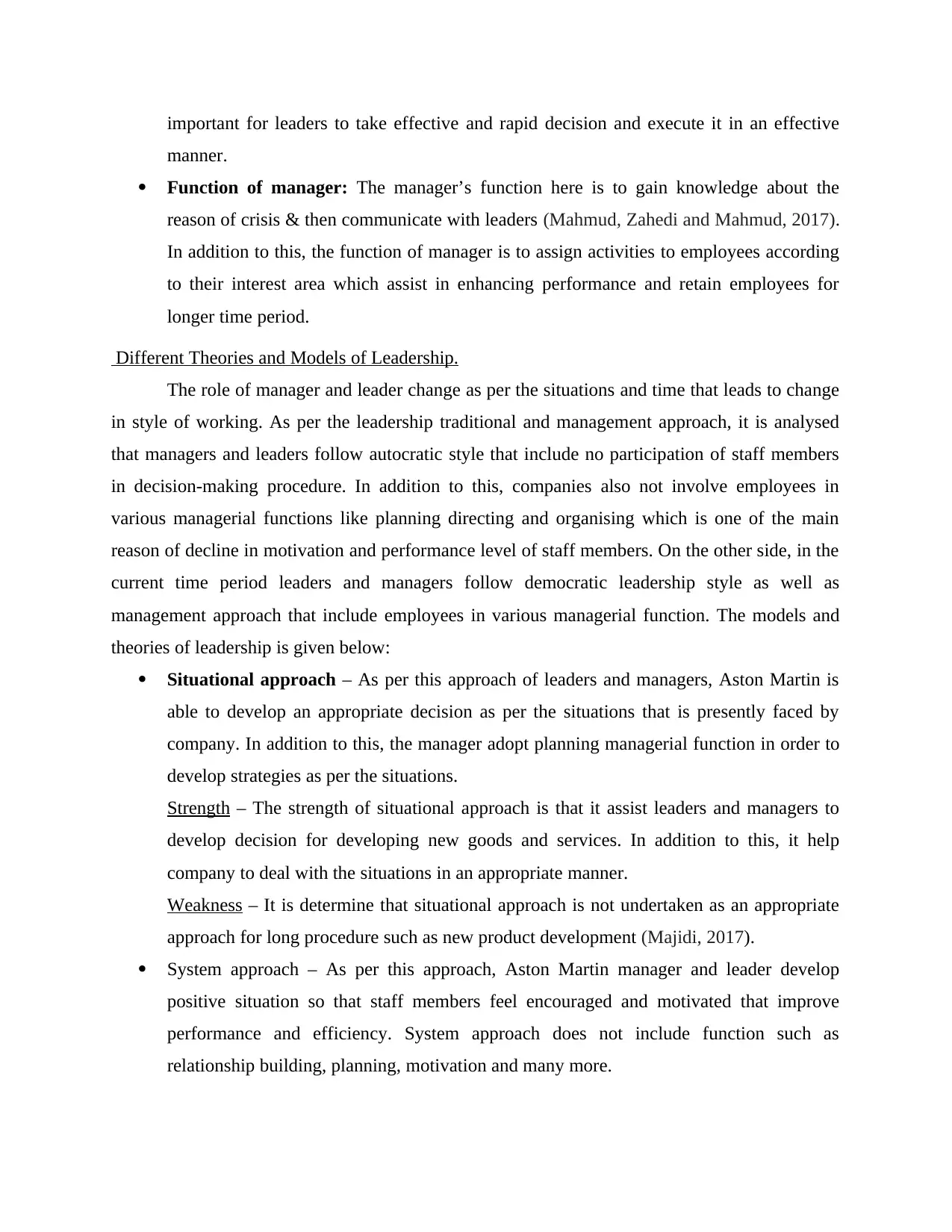
important for leaders to take effective and rapid decision and execute it in an effective
manner.
Function of manager: The manager’s function here is to gain knowledge about the
reason of crisis & then communicate with leaders (Mahmud, Zahedi and Mahmud, 2017).
In addition to this, the function of manager is to assign activities to employees according
to their interest area which assist in enhancing performance and retain employees for
longer time period.
Different Theories and Models of Leadership.
The role of manager and leader change as per the situations and time that leads to change
in style of working. As per the leadership traditional and management approach, it is analysed
that managers and leaders follow autocratic style that include no participation of staff members
in decision-making procedure. In addition to this, companies also not involve employees in
various managerial functions like planning directing and organising which is one of the main
reason of decline in motivation and performance level of staff members. On the other side, in the
current time period leaders and managers follow democratic leadership style as well as
management approach that include employees in various managerial function. The models and
theories of leadership is given below:
Situational approach – As per this approach of leaders and managers, Aston Martin is
able to develop an appropriate decision as per the situations that is presently faced by
company. In addition to this, the manager adopt planning managerial function in order to
develop strategies as per the situations.
Strength – The strength of situational approach is that it assist leaders and managers to
develop decision for developing new goods and services. In addition to this, it help
company to deal with the situations in an appropriate manner.
Weakness – It is determine that situational approach is not undertaken as an appropriate
approach for long procedure such as new product development (Majidi, 2017).
System approach – As per this approach, Aston Martin manager and leader develop
positive situation so that staff members feel encouraged and motivated that improve
performance and efficiency. System approach does not include function such as
relationship building, planning, motivation and many more.
manner.
Function of manager: The manager’s function here is to gain knowledge about the
reason of crisis & then communicate with leaders (Mahmud, Zahedi and Mahmud, 2017).
In addition to this, the function of manager is to assign activities to employees according
to their interest area which assist in enhancing performance and retain employees for
longer time period.
Different Theories and Models of Leadership.
The role of manager and leader change as per the situations and time that leads to change
in style of working. As per the leadership traditional and management approach, it is analysed
that managers and leaders follow autocratic style that include no participation of staff members
in decision-making procedure. In addition to this, companies also not involve employees in
various managerial functions like planning directing and organising which is one of the main
reason of decline in motivation and performance level of staff members. On the other side, in the
current time period leaders and managers follow democratic leadership style as well as
management approach that include employees in various managerial function. The models and
theories of leadership is given below:
Situational approach – As per this approach of leaders and managers, Aston Martin is
able to develop an appropriate decision as per the situations that is presently faced by
company. In addition to this, the manager adopt planning managerial function in order to
develop strategies as per the situations.
Strength – The strength of situational approach is that it assist leaders and managers to
develop decision for developing new goods and services. In addition to this, it help
company to deal with the situations in an appropriate manner.
Weakness – It is determine that situational approach is not undertaken as an appropriate
approach for long procedure such as new product development (Majidi, 2017).
System approach – As per this approach, Aston Martin manager and leader develop
positive situation so that staff members feel encouraged and motivated that improve
performance and efficiency. System approach does not include function such as
relationship building, planning, motivation and many more.
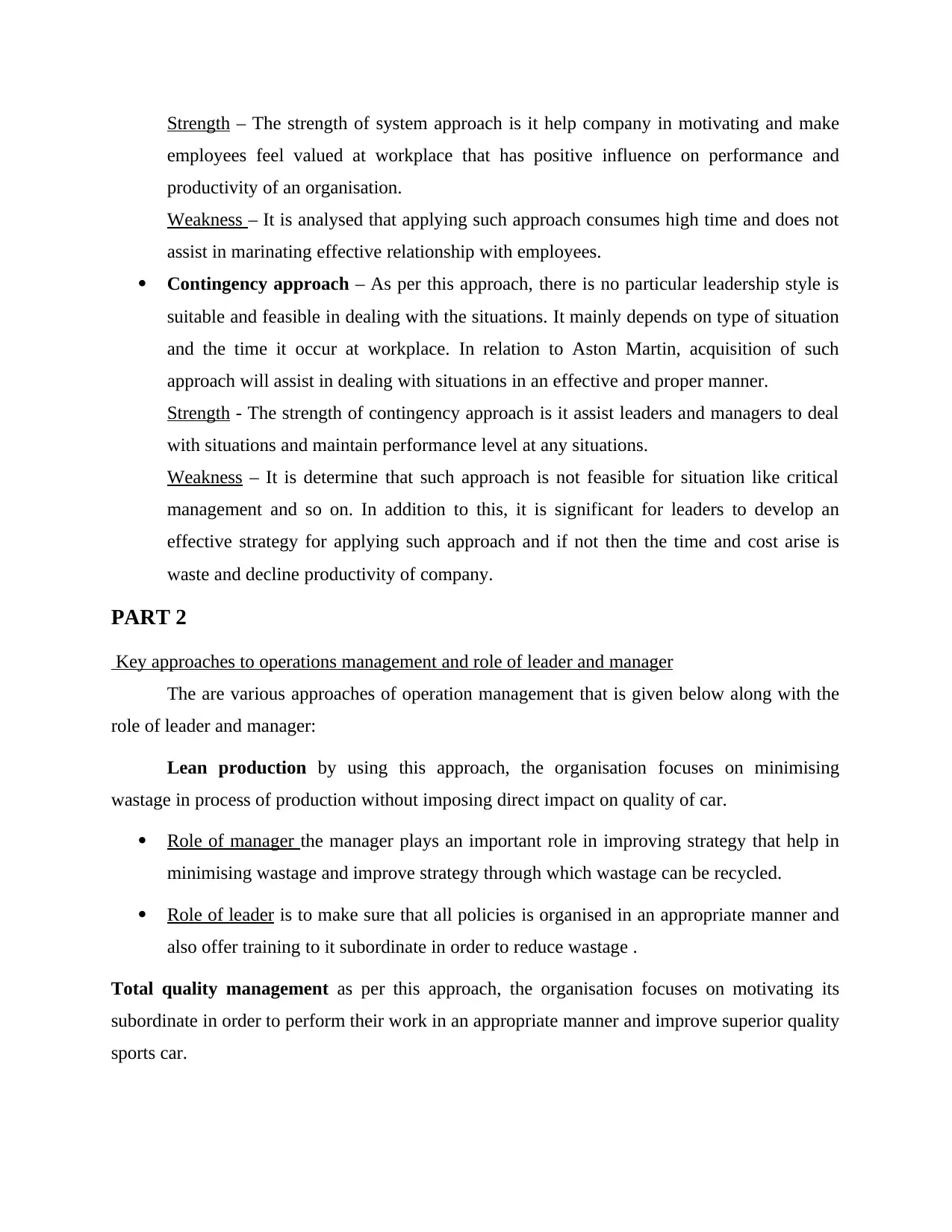
Strength – The strength of system approach is it help company in motivating and make
employees feel valued at workplace that has positive influence on performance and
productivity of an organisation.
Weakness – It is analysed that applying such approach consumes high time and does not
assist in marinating effective relationship with employees.
Contingency approach – As per this approach, there is no particular leadership style is
suitable and feasible in dealing with the situations. It mainly depends on type of situation
and the time it occur at workplace. In relation to Aston Martin, acquisition of such
approach will assist in dealing with situations in an effective and proper manner.
Strength - The strength of contingency approach is it assist leaders and managers to deal
with situations and maintain performance level at any situations.
Weakness – It is determine that such approach is not feasible for situation like critical
management and so on. In addition to this, it is significant for leaders to develop an
effective strategy for applying such approach and if not then the time and cost arise is
waste and decline productivity of company.
PART 2
Key approaches to operations management and role of leader and manager
The are various approaches of operation management that is given below along with the
role of leader and manager:
Lean production by using this approach, the organisation focuses on minimising
wastage in process of production without imposing direct impact on quality of car.
Role of manager the manager plays an important role in improving strategy that help in
minimising wastage and improve strategy through which wastage can be recycled.
Role of leader is to make sure that all policies is organised in an appropriate manner and
also offer training to it subordinate in order to reduce wastage .
Total quality management as per this approach, the organisation focuses on motivating its
subordinate in order to perform their work in an appropriate manner and improve superior quality
sports car.
employees feel valued at workplace that has positive influence on performance and
productivity of an organisation.
Weakness – It is analysed that applying such approach consumes high time and does not
assist in marinating effective relationship with employees.
Contingency approach – As per this approach, there is no particular leadership style is
suitable and feasible in dealing with the situations. It mainly depends on type of situation
and the time it occur at workplace. In relation to Aston Martin, acquisition of such
approach will assist in dealing with situations in an effective and proper manner.
Strength - The strength of contingency approach is it assist leaders and managers to deal
with situations and maintain performance level at any situations.
Weakness – It is determine that such approach is not feasible for situation like critical
management and so on. In addition to this, it is significant for leaders to develop an
effective strategy for applying such approach and if not then the time and cost arise is
waste and decline productivity of company.
PART 2
Key approaches to operations management and role of leader and manager
The are various approaches of operation management that is given below along with the
role of leader and manager:
Lean production by using this approach, the organisation focuses on minimising
wastage in process of production without imposing direct impact on quality of car.
Role of manager the manager plays an important role in improving strategy that help in
minimising wastage and improve strategy through which wastage can be recycled.
Role of leader is to make sure that all policies is organised in an appropriate manner and
also offer training to it subordinate in order to reduce wastage .
Total quality management as per this approach, the organisation focuses on motivating its
subordinate in order to perform their work in an appropriate manner and improve superior quality
sports car.
⊘ This is a preview!⊘
Do you want full access?
Subscribe today to unlock all pages.

Trusted by 1+ million students worldwide
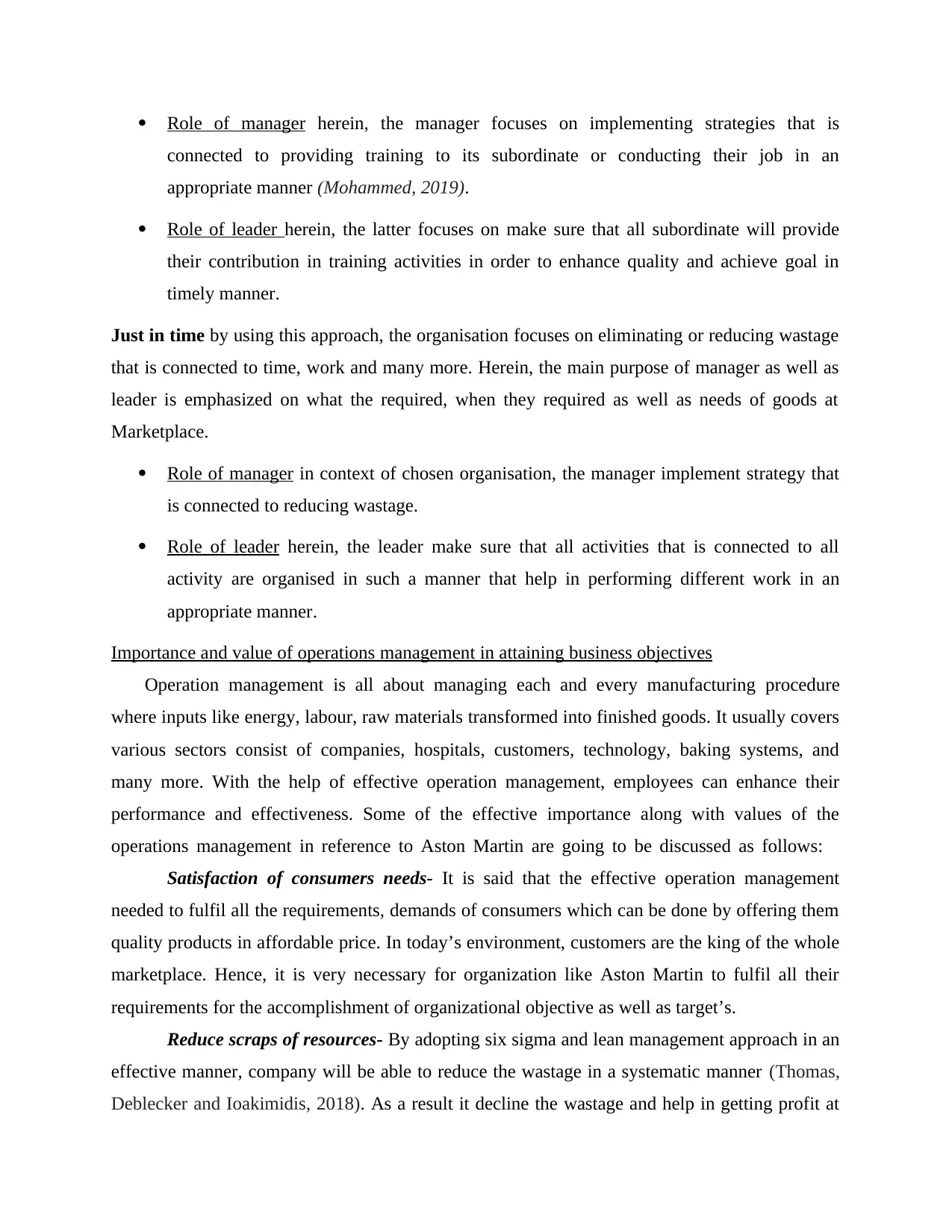
Role of manager herein, the manager focuses on implementing strategies that is
connected to providing training to its subordinate or conducting their job in an
appropriate manner (Mohammed, 2019).
Role of leader herein, the latter focuses on make sure that all subordinate will provide
their contribution in training activities in order to enhance quality and achieve goal in
timely manner.
Just in time by using this approach, the organisation focuses on eliminating or reducing wastage
that is connected to time, work and many more. Herein, the main purpose of manager as well as
leader is emphasized on what the required, when they required as well as needs of goods at
Marketplace.
Role of manager in context of chosen organisation, the manager implement strategy that
is connected to reducing wastage.
Role of leader herein, the leader make sure that all activities that is connected to all
activity are organised in such a manner that help in performing different work in an
appropriate manner.
Importance and value of operations management in attaining business objectives
Operation management is all about managing each and every manufacturing procedure
where inputs like energy, labour, raw materials transformed into finished goods. It usually covers
various sectors consist of companies, hospitals, customers, technology, baking systems, and
many more. With the help of effective operation management, employees can enhance their
performance and effectiveness. Some of the effective importance along with values of the
operations management in reference to Aston Martin are going to be discussed as follows:
Satisfaction of consumers needs- It is said that the effective operation management
needed to fulfil all the requirements, demands of consumers which can be done by offering them
quality products in affordable price. In today’s environment, customers are the king of the whole
marketplace. Hence, it is very necessary for organization like Aston Martin to fulfil all their
requirements for the accomplishment of organizational objective as well as target’s.
Reduce scraps of resources- By adopting six sigma and lean management approach in an
effective manner, company will be able to reduce the wastage in a systematic manner (Thomas,
Deblecker and Ioakimidis, 2018). As a result it decline the wastage and help in getting profit at
connected to providing training to its subordinate or conducting their job in an
appropriate manner (Mohammed, 2019).
Role of leader herein, the latter focuses on make sure that all subordinate will provide
their contribution in training activities in order to enhance quality and achieve goal in
timely manner.
Just in time by using this approach, the organisation focuses on eliminating or reducing wastage
that is connected to time, work and many more. Herein, the main purpose of manager as well as
leader is emphasized on what the required, when they required as well as needs of goods at
Marketplace.
Role of manager in context of chosen organisation, the manager implement strategy that
is connected to reducing wastage.
Role of leader herein, the leader make sure that all activities that is connected to all
activity are organised in such a manner that help in performing different work in an
appropriate manner.
Importance and value of operations management in attaining business objectives
Operation management is all about managing each and every manufacturing procedure
where inputs like energy, labour, raw materials transformed into finished goods. It usually covers
various sectors consist of companies, hospitals, customers, technology, baking systems, and
many more. With the help of effective operation management, employees can enhance their
performance and effectiveness. Some of the effective importance along with values of the
operations management in reference to Aston Martin are going to be discussed as follows:
Satisfaction of consumers needs- It is said that the effective operation management
needed to fulfil all the requirements, demands of consumers which can be done by offering them
quality products in affordable price. In today’s environment, customers are the king of the whole
marketplace. Hence, it is very necessary for organization like Aston Martin to fulfil all their
requirements for the accomplishment of organizational objective as well as target’s.
Reduce scraps of resources- By adopting six sigma and lean management approach in an
effective manner, company will be able to reduce the wastage in a systematic manner (Thomas,
Deblecker and Ioakimidis, 2018). As a result it decline the wastage and help in getting profit at
Paraphrase This Document
Need a fresh take? Get an instant paraphrase of this document with our AI Paraphraser
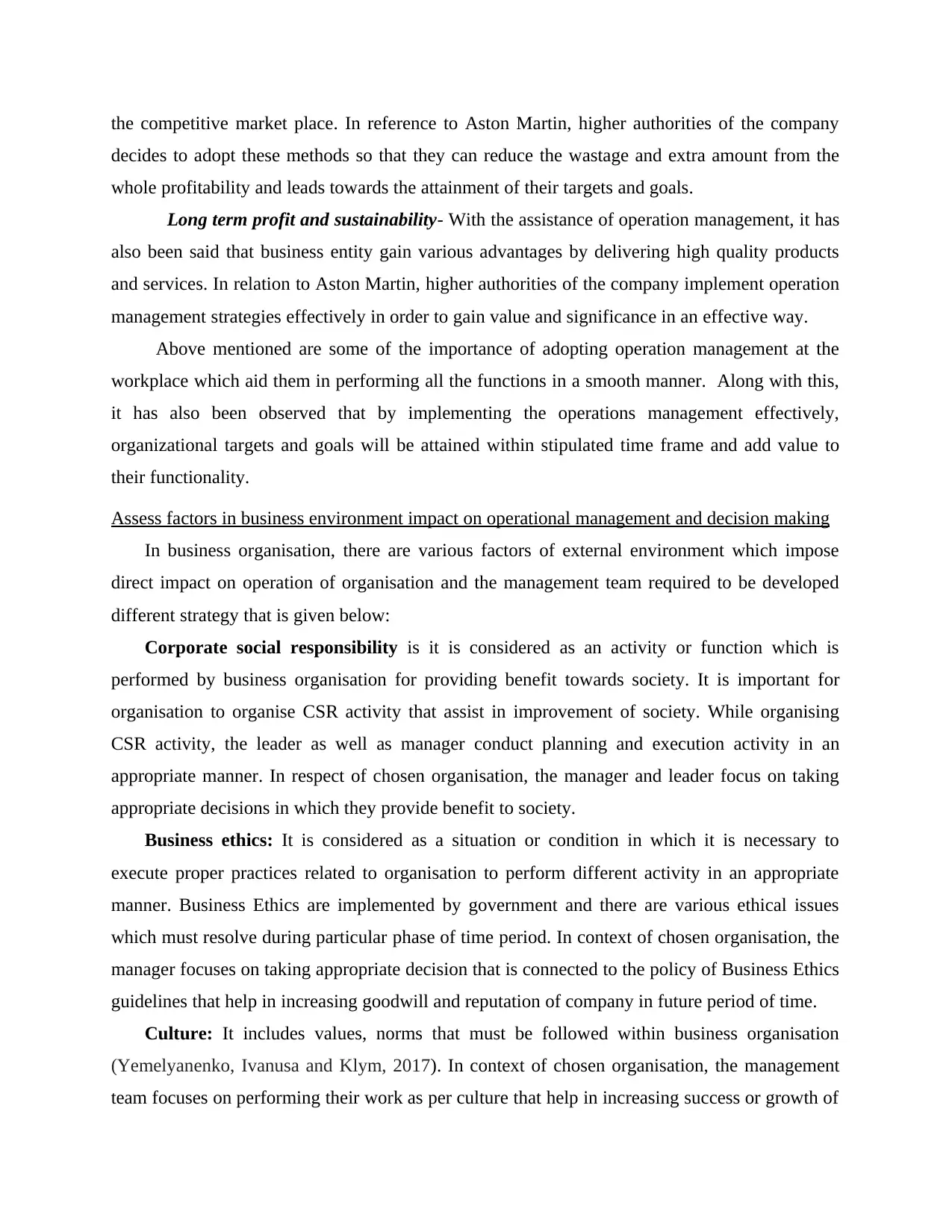
the competitive market place. In reference to Aston Martin, higher authorities of the company
decides to adopt these methods so that they can reduce the wastage and extra amount from the
whole profitability and leads towards the attainment of their targets and goals.
Long term profit and sustainability- With the assistance of operation management, it has
also been said that business entity gain various advantages by delivering high quality products
and services. In relation to Aston Martin, higher authorities of the company implement operation
management strategies effectively in order to gain value and significance in an effective way.
Above mentioned are some of the importance of adopting operation management at the
workplace which aid them in performing all the functions in a smooth manner. Along with this,
it has also been observed that by implementing the operations management effectively,
organizational targets and goals will be attained within stipulated time frame and add value to
their functionality.
Assess factors in business environment impact on operational management and decision making
In business organisation, there are various factors of external environment which impose
direct impact on operation of organisation and the management team required to be developed
different strategy that is given below:
Corporate social responsibility is it is considered as an activity or function which is
performed by business organisation for providing benefit towards society. It is important for
organisation to organise CSR activity that assist in improvement of society. While organising
CSR activity, the leader as well as manager conduct planning and execution activity in an
appropriate manner. In respect of chosen organisation, the manager and leader focus on taking
appropriate decisions in which they provide benefit to society.
Business ethics: It is considered as a situation or condition in which it is necessary to
execute proper practices related to organisation to perform different activity in an appropriate
manner. Business Ethics are implemented by government and there are various ethical issues
which must resolve during particular phase of time period. In context of chosen organisation, the
manager focuses on taking appropriate decision that is connected to the policy of Business Ethics
guidelines that help in increasing goodwill and reputation of company in future period of time.
Culture: It includes values, norms that must be followed within business organisation
(Yemelyanenko, Ivanusa and Klym, 2017). In context of chosen organisation, the management
team focuses on performing their work as per culture that help in increasing success or growth of
decides to adopt these methods so that they can reduce the wastage and extra amount from the
whole profitability and leads towards the attainment of their targets and goals.
Long term profit and sustainability- With the assistance of operation management, it has
also been said that business entity gain various advantages by delivering high quality products
and services. In relation to Aston Martin, higher authorities of the company implement operation
management strategies effectively in order to gain value and significance in an effective way.
Above mentioned are some of the importance of adopting operation management at the
workplace which aid them in performing all the functions in a smooth manner. Along with this,
it has also been observed that by implementing the operations management effectively,
organizational targets and goals will be attained within stipulated time frame and add value to
their functionality.
Assess factors in business environment impact on operational management and decision making
In business organisation, there are various factors of external environment which impose
direct impact on operation of organisation and the management team required to be developed
different strategy that is given below:
Corporate social responsibility is it is considered as an activity or function which is
performed by business organisation for providing benefit towards society. It is important for
organisation to organise CSR activity that assist in improvement of society. While organising
CSR activity, the leader as well as manager conduct planning and execution activity in an
appropriate manner. In respect of chosen organisation, the manager and leader focus on taking
appropriate decisions in which they provide benefit to society.
Business ethics: It is considered as a situation or condition in which it is necessary to
execute proper practices related to organisation to perform different activity in an appropriate
manner. Business Ethics are implemented by government and there are various ethical issues
which must resolve during particular phase of time period. In context of chosen organisation, the
manager focuses on taking appropriate decision that is connected to the policy of Business Ethics
guidelines that help in increasing goodwill and reputation of company in future period of time.
Culture: It includes values, norms that must be followed within business organisation
(Yemelyanenko, Ivanusa and Klym, 2017). In context of chosen organisation, the management
team focuses on performing their work as per culture that help in increasing success or growth of
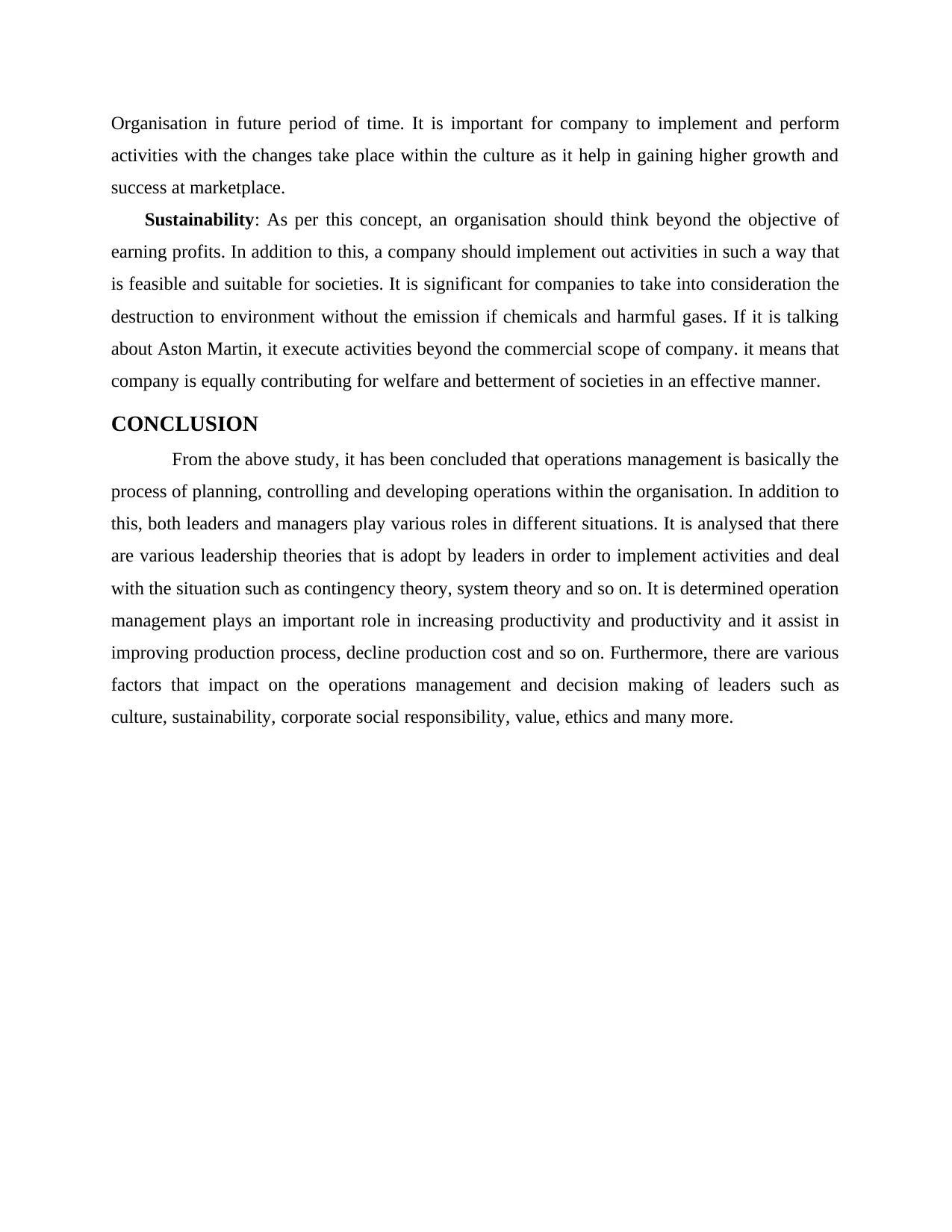
Organisation in future period of time. It is important for company to implement and perform
activities with the changes take place within the culture as it help in gaining higher growth and
success at marketplace.
Sustainability: As per this concept, an organisation should think beyond the objective of
earning profits. In addition to this, a company should implement out activities in such a way that
is feasible and suitable for societies. It is significant for companies to take into consideration the
destruction to environment without the emission if chemicals and harmful gases. If it is talking
about Aston Martin, it execute activities beyond the commercial scope of company. it means that
company is equally contributing for welfare and betterment of societies in an effective manner.
CONCLUSION
From the above study, it has been concluded that operations management is basically the
process of planning, controlling and developing operations within the organisation. In addition to
this, both leaders and managers play various roles in different situations. It is analysed that there
are various leadership theories that is adopt by leaders in order to implement activities and deal
with the situation such as contingency theory, system theory and so on. It is determined operation
management plays an important role in increasing productivity and productivity and it assist in
improving production process, decline production cost and so on. Furthermore, there are various
factors that impact on the operations management and decision making of leaders such as
culture, sustainability, corporate social responsibility, value, ethics and many more.
activities with the changes take place within the culture as it help in gaining higher growth and
success at marketplace.
Sustainability: As per this concept, an organisation should think beyond the objective of
earning profits. In addition to this, a company should implement out activities in such a way that
is feasible and suitable for societies. It is significant for companies to take into consideration the
destruction to environment without the emission if chemicals and harmful gases. If it is talking
about Aston Martin, it execute activities beyond the commercial scope of company. it means that
company is equally contributing for welfare and betterment of societies in an effective manner.
CONCLUSION
From the above study, it has been concluded that operations management is basically the
process of planning, controlling and developing operations within the organisation. In addition to
this, both leaders and managers play various roles in different situations. It is analysed that there
are various leadership theories that is adopt by leaders in order to implement activities and deal
with the situation such as contingency theory, system theory and so on. It is determined operation
management plays an important role in increasing productivity and productivity and it assist in
improving production process, decline production cost and so on. Furthermore, there are various
factors that impact on the operations management and decision making of leaders such as
culture, sustainability, corporate social responsibility, value, ethics and many more.
⊘ This is a preview!⊘
Do you want full access?
Subscribe today to unlock all pages.

Trusted by 1+ million students worldwide
1 out of 13
Related Documents
Your All-in-One AI-Powered Toolkit for Academic Success.
+13062052269
info@desklib.com
Available 24*7 on WhatsApp / Email
![[object Object]](/_next/static/media/star-bottom.7253800d.svg)
Unlock your academic potential
Copyright © 2020–2026 A2Z Services. All Rights Reserved. Developed and managed by ZUCOL.





